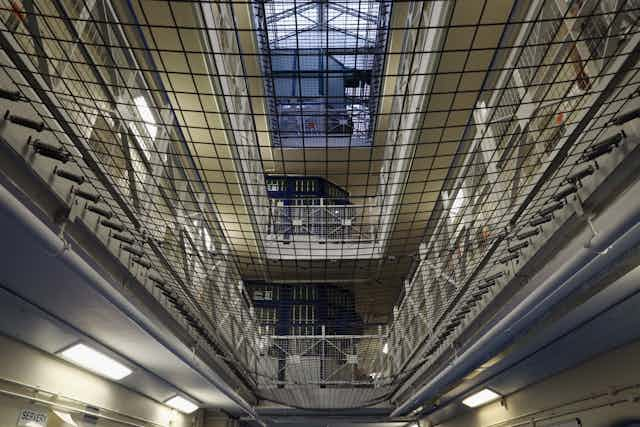A recent critical report on the partial privatisation of the probation service by the chief inspector of probation, Glenys Stacey, highlighted the need to reassess the extensive outsourcing of public sector contracts to the private sector. The report also came in the wake of the downfall of Interserve, the government contractor which went into administration in March.
The outsourcing of public services to private sector companies is intended to provide several benefits. It is meant to transfer risk to the private sector, which can potentially both operate more efficiently than the public sector and encourage innovation.
Overall, outsourcing is meant to reduce costs and provide better value for money for taxpayers. Supporters point to successful examples of outsourcing. These include the provision of front line services such as refuse collection and street cleaning for local authorities, along with back office functions including IT and finance services provided for local and central government. In order to be successful, the services need to be stipulated in detailed contracts which are then monitored effectively.
But providing contracts for services dealing with people, such as probation, has proved to be very problematic. In June 2014, probation services for low and medium risk offenders were transferred to 21 Community Rehabilitation Companies (CRCs) owned by eight, mainly private sector, suppliers working under contracts to 2021-22.
The CRCs were intended to provide better value for money, to innovate and find new ways to rehabilitate offenders. The reality, as the chief inspector wrote in her introduction to the report, was that probation supervision provided under contract is “sub-standard” and “much of it demonstrably poor”.
The key problem with the partial privatisation is that probation “is a complex social service, with professional judgement at its heart” and so “it has proved well-nigh impossible to reduce probation services to a set of contractual requirements”. Probation work “is so much more than simply a series of transactions” and the “impact of commerce” has led to a “deplorable diminution of the probation profession and a widespread move away from good probation practice”.
The chief inspector argued that the government’s decision to end the contracts early in December 2020, with the intention of re-contracting on better terms, may help to improve the probation service but will still leave “serious design flaws”. An alternative approach would be to recognise the serious failings identified by the chief inspector and bring all of the probation work back into the public sector.
The rail experience
Re-contracting is also the preferred government response to problems which have arisen with outsourced rail franchises. As my own research has documented, franchise bidding was a key element of rail privatisation introduced by the government of the Conservative prime minister John Major in the 1990s.
It was meant to improve services, and reduce subsidy, by attracting new entrants into the rail industry. Bidders are expected to offer premium payments to government on profitable franchise routes, or to bid to operate at minimum subsidy on loss-making routes.
In practice, however, there are only a small number of bidders for each franchise, and there have been recurring problems with train operators winning franchises on the basis of over-optimistic bids and then having to be replaced. This has now happened three times on the East Coast Main Line franchise.

Supporters of rail privatisation argued that the introduction of competition and private sector management would, in the long run, improve efficiency, reduce costs, eliminate subsidy and provide better services for passengers. In practice, my research has detailed how rail costs have doubled in real terms under privatisation. The current rail subsidy of £4 billion is several times the subsidy received by the much-criticised British Rail in the years before privatisation. Yet passengers in the Thameslink, Southern and Great Northern franchise have suffered from many delays and disruptions..
Rail privatisation, far from improving efficiency, fragmented an integrated industry into many constituent parts: an infrastructure provider (now Network Rail, which is in the public sector and replaced the failed Railtrack); franchised train operating companies; and rolling stock companies which lease trains to the operating companies.
An honest debate
The fundamental problem with financing rail is that it is a highly capital-intensive industry, and so it is difficult to cover the costs of both the rail infrastructure and train operations from fares. This dilemma has been critical for rail under both private and public ownership. British Rail came closest to resolving the dilemma before its privatisation by undertaking major organisational reforms which resulted in very significant improvements in productivity and punctuality.
An alternative approach to the outsourcing model would be to bring rail franchises back into the public sector at no cost as they expired, or as operators run into financial difficulty, and merge them with Network Rail. The industry could then be gradually reintegrated, and substantial savings made as dividends would no longer be paid to franchise shareholders and the costs relating to fragmentation would be reduced.
A highly critical report on rail franchising in 2018 by MPs on the Public Accounts Committee argued that the problems with the East Coast and Thameslink, Southern and Great Northern franchises, combined with the small pool of potential franchise bidders, “highlight the broken model of franchising”.
The problems experienced with the partial privatisation of the probation service and rail franchising indicate the need for a fundamental reassessment of the principle and risks of outsourcing. Simply replacing private sector suppliers with new contractors, especially in sensitive, people-focused services such as probation, is not a solution. There needs to be an honest debate about the benefits of public services, and the level of taxation needed to support them.

